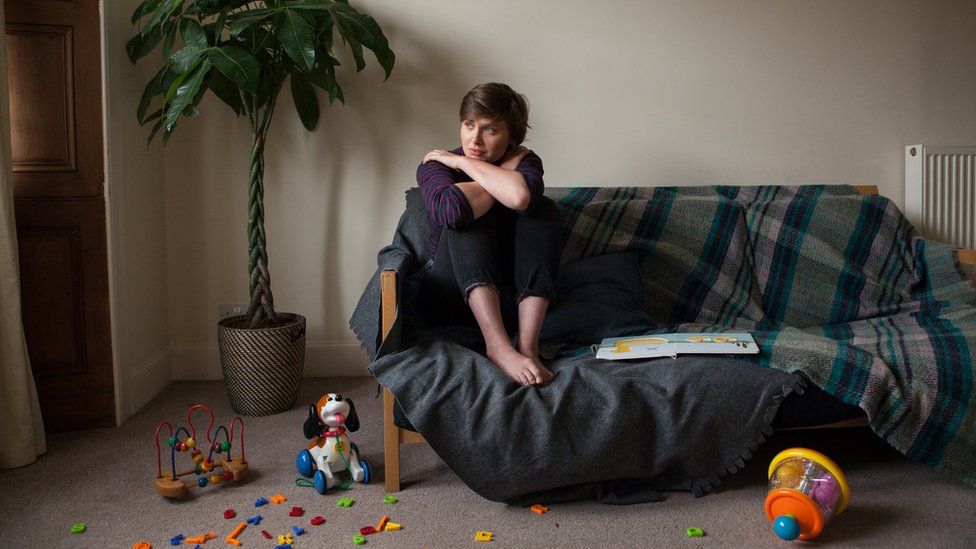New domestic abuse law 'could change Scotland'
- Published

A bill to criminalise psychological domestic abuse has been passed, with some campaigners saying it "could change Scotland forever".
The Domestic Abuse bill, which has wide backing, creates a specific offence of "abusive behaviour in relation to a partner or ex-partner".
This includes psychological abuse such as coercive and controlling behaviour as well as violence.
Critics claimed it could be difficult to gather sufficient evidence.
However MSPs voted by 118 to one to pass the legislation, with every member speaking in favour during the final debate.
It later emerged that Conservative Margaret Mitchell - who had spoken of the "total consensus" behind the bill - had recorded the only vote against.
She said she pressed the wrong button during the vote and blamed the mistake on not wearing her glasses.
Members stood to applaud domestic abuse survivors in the public gallery after the result was announced.
Justice Secretary Michael Matheson said it was a "momentous day", saying laws would now "reflect the experience all to many women have suffered".
He said: "Attitudes towards domestic abuse have changed considerably since this Parliament was established in 1999. Back then, some were of the mindset that domestic abuse - especially where it did not involve physical violence - was a private matter. Attitudes have rightly changed - albeit further work is needed to challenge lingering outdated or dismissive attitudes.
"I am very grateful to the domestic abuse survivors who presented their evidence to the justice committee.
"Their courage helped shaped the legislation I brought to parliament, and their actions will help the justice system prosecute those who commit one of society's most insidious crimes."
What constitutes abusive behaviour?
The new legislation says abusive behaviour is:
Behaviour that is violent, threatening or intimidating
Behaviour whose purpose is one of the following:
- making a partner dependent or subordinate
- isolating a partner from friends, relatives or other sources of support
- controlling, regulating or monitoring a partner's day-to-day activities
- depriving a partner of, or restricting, freedom of action
- frightening, humiliating, degrading or punishing a partner.
The offence is aggravated if any of the behaviour is directed at a child or witnessed by them.
Victimless prosecution
However, Dr Marsha Scott, the chief executive of Scottish Women's Aid, said she was "excited" about the legislation.
She said: "Women have been telling us for 40 years that it is psychological and emotional abuse that is the most traumatic for them and the hardest to recover from, yet for such a long time we had absolutely no tools in legislation to take their stories seriously and hold abusers accountable for the untold harm that they wreak."
Ms Scott said it was the first bill in the world to create a way of "victimless prosecution".
She said: "It does not blame women and it does not mean women have to come into court and prove how harmed they have been by the abuse.
"In fact it is all structured in looking at the behaviour of the perpetrator and asking 'would a reasonable person think that this could be harmful?'."
'I didn't know emotional abuse was a thing'
Looking back Jennifer says it is "as clear as day" that she suffered emotional abuse in her relationship with her ex-boyfriend.
However, at the time, she did not realise how bad it was because it was "death by a thousand cuts".
"You think 'he doesn't like that so I'd better change that bit about me'," she says.
"You start to clock up these ideas of 'I'd better not wear this' or 'if I say this or I'm too loud then maybe it's my fault'."
Sufficient evidence
Grazia Robertson, a criminal solicitor in Glasgow, told BBC Scotland it could be difficult to secure prosecutions.
"How would you gather sufficient evidence to successfully prosecute in a criminal court?" she said
"I think there will be problems."
She said the bill acknowledges that prosecutions may not be able to rely on evidence from the person who has been abused.
"You may be relying on the evidence or perceptions of other people and that will make it more difficult," she said.
Dr Scott, from Scottish Women's Aid, said: "There are a lot of myths out there that somehow it will be hard to get evidence to support prosecutions.
"Actually it is much harder to corroborate a threat to someone that is a one-off.
"This law will take an incident and look at it as a course of conduct.
"That will then mean there are lots of opportunities to gather evidence - there are texts, receipts and financial abuse, there are friends' stories, there are all kinds of things that will help to provide evidence of what was going on."
She said there was work to be done to build the confidence of victims and the training of police and prosecutors but "this week we will know there is a possibility that this law will change Scotland forever".
- Published28 September 2017